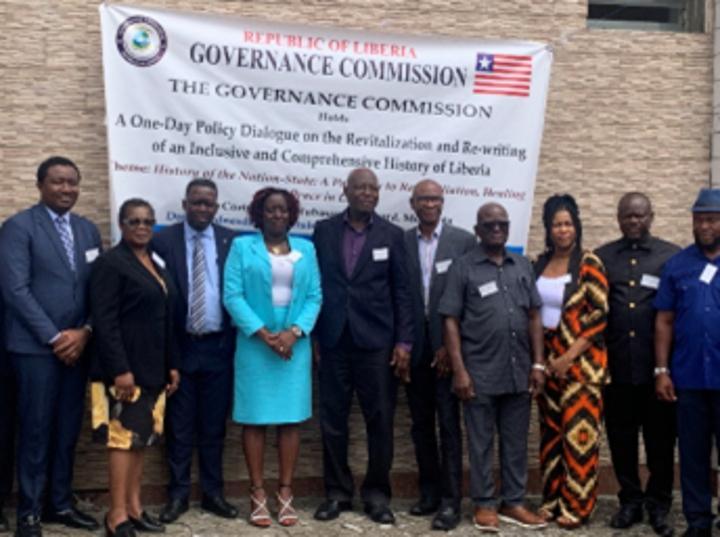Africa-Press – Liberia. In a bold step toward national healing and unity, the Governance Commission of Liberia convened a one-day policy dialogue to revive stalled Liberia National History Project (LNHP)
The day-long dialogue was held under the theme “History of the Nation-State: Pathway to Reconciliation, Healing, and Peace.” The event brought together policymakers, historians, educators, and civil society leaders committed to rewriting a more inclusive and comprehensive history of the nation.
Delivering opening remarks, Professor Alaric K. Tokpa, Acting Chairman of the Governance Commission, emphasized the urgent need to reconstruct Liberia’s national narrative in a way that embraces full diversity of its people.
“For far too long, the story of Liberia has been told in fragments, shaped by exclusion, silence, and selective memory,” Tokpa said. “To build peace, we must remember the past, promote understanding, and acknowledge the voices that shape our collective journey”, he underscored.
The GC Acting Chair, Tokpa, however, called for a renewed commitment to telling Liberia’s story not as a political project, but as a national one that honors both suffering and triumph.
“Today’s dialogue is not just a reflection but a recommitment,” Tokpa stressed. “We must write a national history that is not a mere document, but a mirror — one that reflects the dignity, resilience, and diversity of all Liberians.”
He emphasized that the new history must not shy away from uncomfortable truths, but instead use them as stepping stones toward justice and national cohesion.
He underscored the importance of including youth, traditional leaders, women, and religious institutions, all of whom have been vital to Liberia’s journey but are often excluded from official histories.
A National Story for All Liberians
Participants noted that Liberia’s history has historically centered on the arrival of settlers in 1822, marginalizing the rich cultural heritage and contributions of indigenous communities.
Commissioner Cytirus Kerbay, providing an overview of the project, highlighted that this imbalance was one of the key concerns raised by the Truth and Reconciliation Commission (TRC), which recommended rewriting of a general national history as a tool for peace and reconciliation.
The Liberia National History Project (LNHP), initiated in 2013 with support from UNESCO and the Liberian government, aimed to develop textbooks, curricula, and scholarly works that reflected the full spectrum of Liberia’s history. However, the project stalled due to a lack of funding.
For his part, Stevenson Seidi, former head of UNESCO’s office in Liberia, also delivered poignant remarks.
Speaking as a concerned Liberian rather than a UNESCO official, Seidi critiqued the current historical narrative for being “one-sided, deceptive, and discriminatory.”
“Our history”, he stressed, “must be a shared journey, not a contest between settlers and natives. If told inclusively, it can help us reconcile, heal, and build lasting peace. If told narrowly, it risks deepening mistrust and reigniting past wounds.”
He proposed a broader effort that includes rewriting school textbooks, reviewing Liberia’s national symbols and honors, and establishing museums, memorials, and oral history projects that reflect collective memory.
Seidi also urged the government to take ownership of the process and involve Liberian historians, both at home and in the diaspora, to ensure the final product truly reflects the nation’s unique heritage.
Reviving a Dormant Effort
The Governance Commission confirmed that archived materials from earlier history project are available and will be turned over to a new team tasked with reviving the effort.
The Commission also introduced Dr. William Allen, a prominent academic and lead presenter at the dialogue, who played a key role in the project’s early stages.
“This is not only about recording the past,” said one official, “but about shaping a future where every Liberian sees themselves in the national story.”
As the event concluded, participants echoed a common theme: the rewriting of Liberia’s history is not simply an academic exercise, but a nation-building imperative.
“History is not fixed,” said Seidi. “Our task is not to erase the past, but to expand it to weave together the voices, memories, and dreams of all Liberians into one shared narrative. Only then can history become a true pathway to reconciliation, healing, and peace.”
For More News And Analysis About Liberia Follow Africa-Press






